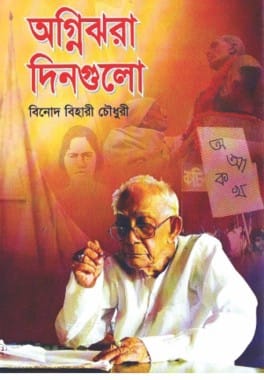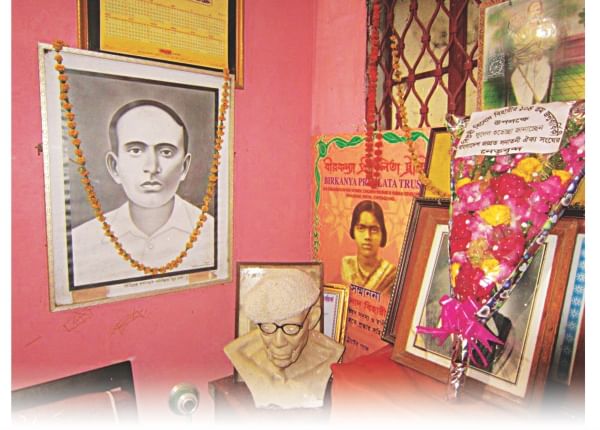Binod Bihari Chowdhury: The Last of the Mohicans
 Book cover of Agnijhora Dingulo.
Book cover of Agnijhora Dingulo.
April 18, 1930. 73 years after Sepoy Rajob Ali of Chittagong took arms that ignited the 1857 Sepoy Mutiny, Chittagong ignited once again. Master Da' Surya Sen and his brave men and women attacked the 'eyes of the dragon'. The Chittagong police and army armoury were raided. Telegraph and rail lines were snapped. For four days, Chittagong was free from the clutches of India's colonial masters. In the end, The British brutally crushed the uprising. Master Da' walked the gallows. Binod Bihari Chowdhury (1911-2013) remained 'The Last of the Mohicans' for decades to come. Alas! He too left on April 10, 2013.
Binod Bihari Chowdhury (Jan 10, 1911- Apr 10, 2013) was born in Uttar Bhurshi village of Boalkhali, Chittagong. He was the fifth child of Kamini Kumar Chowdhury (Lawyer) and Roma Rani Chowdhury (Housewife). At Coronation School at Fatikchhari, Binod met Ramkrishna Biswas, the first boy of Class X. Through books, Ramkrishna introduced Binod to a world of great men and revolutionaries. The book 'Desher Kotha' was an eye opener. It exposed the unjust British Rule in India. Binod decided to join the revolutionaries of his time. His chance came very soon.
Jugantor, Anushilon, Forward Block were among the leading revolutionary groups in 1920's Chittagong. These groups believed British Colonial Rule in India could end through armed struggle. Through Ramkrishna, Binod became a member of Jugantor in 1928. The leader Master Da' Surya Sen was then in jail. Binod's first encounter with Master Da' was in 1929 at Abhoymitra Cremation Ground at Boluar Dighi, Korbaniganj, Chittagong. Master Da' discouraged Binod to join Jugantor, but Binod's mind was set. A year later, Binod became a part of history.
The Chittagong Armoury Raid included women. Pritilata Waddedar and Kalpana Dutta were in the group. Master Da' divided the team into four groups. Binod was in the group that would attack the Police armoury (Dampara, near today's WASA). The operation started at 10pm on April 18, 1930. The revolutionaries succeeded in disconnecting Chittagong and also capturing the European Headquarter (in Pahartali, now Railway Office). Master Da' proclaimed Chittagong free. The revolutionaries left the city and took refuge in the hills.
 Living with the Memories of 1930s Chittagong.
Living with the Memories of 1930s Chittagong.
Unfortunately, April 18, 1930 was Good Friday. Many of the British officers were at home. They could thus take guard and prepare for a counter-attack. Four days later, April 22, 1930 thousands of troops ambushed the revolutionaries at the Jalalabad Hills (in today's Chittagong Cantonment). The British troops crushed the uprising. Master Da' and Binod survived, but Binod was wounded by a bullet that passed through the left side of his neck.
Master Da' went into hiding and moved from one place to another. In 1933, one of his relatives, Netra Sen, informed the British for a ransom of Tk 10,000. Master Da' was arrested February 2, 1933. Netra Sen could not enjoy his prize money. A member of Master Da's group came and killed Netra Sen.
Tarekshwar Dastidar tried to rescue Master Da' from Chittagong Jail. The British found out. Tarekshwar, Kalpana Datta and others were arrested. Master Da' and Tarekshwar were sentenced to death. After brutal torture at the hands of the British, Master Da' and Tarekshwar were hanged January 12, 1934. Chittagong's freedom was short-lived, but it was a catalyst to 1947 when the Raj was partitioned in 'freedom at midnight'.
After partition, Binod remained in Chittagong and contributed towards the society in his own way. His wife and life partner of seventy years, Biva Das (Died 2009), was a teacher of Aparna Charan Girls' School. To run the family, Binod started private tuitions of students of Aparna Charan. In no time, he became popular. His students did well. Master Da's lieutenant, Binod Bihari Chowdhury, now became Binod Dadu to the children. Many children of Chittagong have received lessons from Dadu. While passing on the spirit of freedom to the young generation, Dadu was always aware of his responsibilities in speaking out against injustice in the society.
In January this year, during my last visit to my birthplace and motherland, Chittagong, I promised my daughter, Annapurna, I would take her to historical places. We visited JM Sen Hall where busts of Master Da' and other revolutionaries of 1930's Chittagong are preserved. Amazing! Old age could not defeat Binod Dadu. Dadu had gone to Dhaka to celebrate his 104th birthday at the Muktijuddha Jadughar. I took my daughter to Dadu's house in Momin Road (near Cheragi Pahar Roundabout). We learned Dadu returned and would give us a few minutes. There we were with 'The Last of the Mohicans' in a room decorated with memories of Master Da', Pritilata and other revolutionaries of 1930's Chittagong—a golden era in our history. I introduced Dadu to my daughter as Master Da' Surya Sen's youngest friend. Dadu's gentle smile as a response is now sealed in my heart. We are very lucky Dadu blessed us.
Binod Dadu, Master Da', Pritilata, Kalpana, Tarekshwar of Chittagong all played their part to establish a just society. Because of them, we found inspiration in 1947, 1952, 1969, 1971, 1991, and also now in 2013. The ball is now in the court of today's Campus Generation to play their role in establishing a society free of discrimination. Binod Dadu- The Last of the Mohicans of glorious Chittagong- faretheewell, but never goodbye.
(The author teaches economic theory at Jahangirnagar University)

 For all latest news, follow The Daily Star's Google News channel.
For all latest news, follow The Daily Star's Google News channel. 



Comments